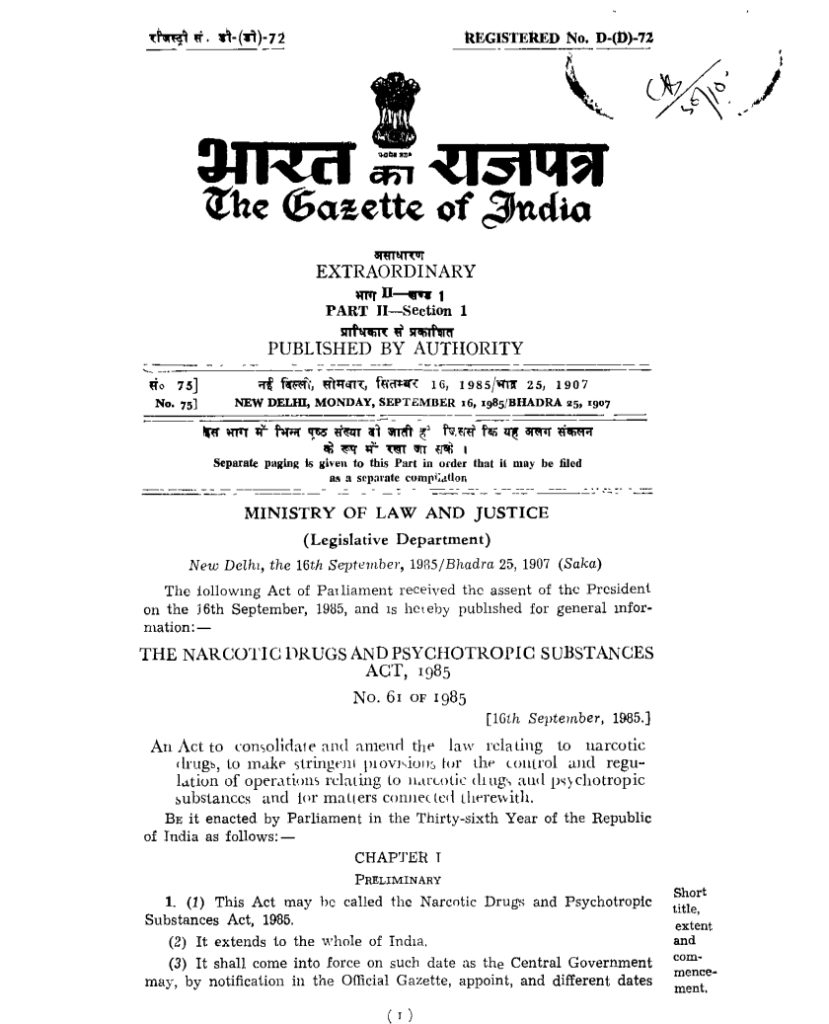The Narcotic Drugs and Psychotropic Substances Consultative Committee is an important body constituted under the Narcotic Drugs and Psychotropic Substances Act, 1985 (NDPS Act). The Committee plays a crucial role in advising the Central Government on matters related to the administration of the NDPS Act, including the control and regulation of narcotic drugs and psychotropic substances in India.

Constitution of the Committee
The Narcotic Drugs and Psychotropic Substances Consultative Committee is constituted by the Central Government, as per the provisions of the NDPS Act. The key aspects of its constitution include:
1. Composition:
The Committee is composed of members nominated by the Central Government. These members typically include experts in the field of law, medicine, pharmacology, drug control, and representatives from various ministries, including the Ministry of Health and Family Welfare, Ministry of Home Affairs, Ministry of Finance, and other relevant departments.
The Committee may also include representatives from law enforcement agencies, such as the Narcotics Control Bureau (NCB), as well as representatives from the pharmaceutical industry and other stakeholders involved in the regulation of narcotic drugs and psychotropic substances.
2. Chairperson: The Chairperson of the Committee is appointed by the Central Government from among the members. The Chairperson is usually a senior official from one of the relevant ministries or an expert with significant experience in drug control and regulation.
3. Tenure: The tenure of the members of the Committee is determined by the Central Government, and they may serve for a fixed period or until further orders.
4. Meetings: The Committee meets periodically, as required, to discuss and deliberate on issues related to the NDPS Act. The frequency of the meetings is determined based on the need for consultation and advice on various matters.
Functions of the Committee
The Narcotic Drugs and Psychotropic Substances Consultative Committee performs several key functions that are critical to the effective administration of the NDPS Act. These functions include:
1. Advisory Role:
The primary function of the Committee is to advise the Central Government on matters related to the administration of the NDPS Act. This includes providing recommendations on policy formulation, regulation, and control of narcotic drugs and psychotropic substances.
2. Review of Existing Laws and Policies:
The Committee reviews the existing laws, rules, and policies related to narcotic drugs and psychotropic substances and suggests amendments or improvements to ensure they are effective in controlling drug abuse and trafficking.
The Committee may also recommend new legislation or regulations as needed to address emerging challenges in drug control.
3. Coordination Among Agencies:
The Committee facilitates coordination among various government agencies involved in the enforcement of the NDPS Act, including the Narcotics Control Bureau (NCB), Customs and Excise departments, police forces, and state governments.
It provides a platform for these agencies to discuss operational challenges, share best practices, and ensure a unified approach to drug control.
4. International Cooperation:
The Committee advises the Central Government on matters related to international cooperation in drug control, including India’s obligations under international treaties and conventions.
It may also provide recommendations on bilateral and multilateral agreements related to drug control and the exchange of information with other countries.
5. Regulation of Controlled Substances:
The Committee reviews and recommends the inclusion or exclusion of substances in the list of controlled substances under the NDPS Act. This includes both narcotic drugs and psychotropic substances, as well as precursor chemicals used in their manufacture.
The Committee also advises on the regulation of the production, distribution, and sale of controlled substances to prevent their misuse.
6. Promotion of Research and Education:
The Committee promotes research on the medical, scientific, and social aspects of narcotic drugs and psychotropic substances. It encourages studies on drug addiction, treatment methods, and the development of new therapeutic drugs that can replace or reduce the use of controlled substances.
The Committee may also recommend the introduction of educational programs aimed at raising awareness about the dangers of drug abuse and the importance of drug control measures.
7. Monitoring and Evaluation:
The Committee monitors the implementation of the NDPS Act and evaluates the effectiveness of various control measures. It provides feedback to the Central Government on the successes and challenges faced in enforcing the Act.
The Committee may also recommend the establishment of monitoring mechanisms to track the production, distribution, and use of narcotic drugs and psychotropic substances in India.
8. Public Awareness and Outreach:
The Committee plays a role in advising the government on public awareness campaigns aimed at reducing drug abuse and educating the public about the legal and health consequences of drug use.
It may suggest strategies for outreach programs targeting vulnerable populations, such as youth and individuals at risk of drug addiction.
9. Recommendations on Licensing and Permits:
The Committee provides recommendations on the issuance of licenses and permits for the production, manufacture, sale, and distribution of narcotic drugs and psychotropic substances. This includes advising on the criteria for licensing and the conditions that should be imposed on license holders.
The Committee also reviews the process for granting exemptions and special permissions under the NDPS Act.
10. Consultation on Enforcement Actions:
The Committee advises the government on enforcement actions against violators of the NDPS Act, including penalties, prosecution, and preventive measures.
It may also recommend strategies for improving the detection and prosecution of drug-related offences, including the use of technology and intelligence-sharing among agencies.
Conclusion
The Narcotic Drugs and Psychotropic Substances Consultative Committee is a vital advisory body that supports the Central Government in effectively implementing and enforcing the NDPS Act. Through its diverse functions, the Committee helps ensure that India’s drug control policies are comprehensive, effective, and aligned with international standards. By facilitating coordination among various stakeholders, promoting research, and advising on regulatory measures, the Committee plays a crucial role in India’s efforts to combat drug abuse and illicit trafficking.

